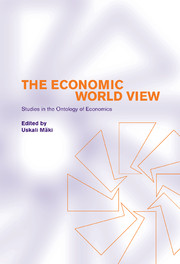Book contents
- Frontmatter
- Contents
- Notes on the contributors
- Preface
- I The what, why, and how of economic ontology
- II Rationality and homo economicus
- 4 The normative core of rational choice theory
- 5 The virtual reality of homo economicus
- 6 Expressive rationality: is self-worth just another kind of preference?
- 7 Agent identity in economics
- 8 Chances and choices: notes on probability and belief in economic theory
- Part III Micro, macro, and markets
- Part IV The world of economic causes
- Part V Methodological implications of economic ontology
- Name index
- Subject index
8 - Chances and choices: notes on probability and belief in economic theory
Published online by Cambridge University Press: 04 August 2010
- Frontmatter
- Contents
- Notes on the contributors
- Preface
- I The what, why, and how of economic ontology
- II Rationality and homo economicus
- 4 The normative core of rational choice theory
- 5 The virtual reality of homo economicus
- 6 Expressive rationality: is self-worth just another kind of preference?
- 7 Agent identity in economics
- 8 Chances and choices: notes on probability and belief in economic theory
- Part III Micro, macro, and markets
- Part IV The world of economic causes
- Part V Methodological implications of economic ontology
- Name index
- Subject index
Summary
A recurring point of contention in rational choice theory is the legitimacy or otherwise of assuming that decision-makers choose as if they were guided by precise numerical probabilities of the consequences of their actions. Economists, broadly speaking, fall into two groups on this issue. One holds that beliefs can only be taken to correspond to point probabilities in situations that approximate games of chance or where numerical probabilities can be assigned to events on the basis of a knowledge of relative frequencies. The other holds that beliefs should be treated as point probabilities, entering economics via decision theory and emerging as the parameters of consistent choice. I shall call these the traditional and the Bayesian view respectively.
An important feature of the Bayesian view is that it makes it possible to apply rational choice theory even in situations in which there are no obvious ‘objective' probabilities. This feature has contributed enormously to its popularity in economic theory and, until quite recently, to the steady decline of the distinction between risk and uncertainty that tends to accompany the traditional view (between situations in which agents' beliefs about random outcomes are, or are based on, point probabilities and situations in which they are not). In fact, even now the dominance of the Bayesian view is such that some of its more prominent proponents feel justifed in declaring the distinction a ‘sterile one' (e.g. Hirshleifer and Riley 1992, p. 10). Yet there have always been some who have continued to insist on the importance of uncertainty as distinct from risk in economic analysis, particularly in the more heterodox strands of the discipline.
- Type
- Chapter
- Information
- The Economic World ViewStudies in the Ontology of Economics, pp. 132 - 154Publisher: Cambridge University PressPrint publication year: 2001
- 5
- Cited by



